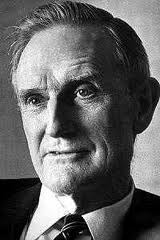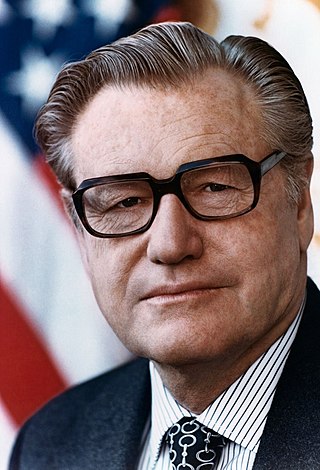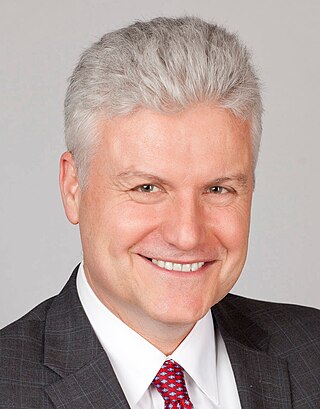Related Research Articles

The Trilateral Commission is a nongovernmental international organization aimed at fostering closer cooperation between Japan, Western Europe and North America. It was founded in July 1973, principally by American banker and philanthropist David Rockefeller, an internationalist who sought to address the challenges posed by the growing economic and political interdependence between the U.S. and its allies in North America, Western Europe, and Japan. The leadership of the organization has since focused on returning to "our roots as a group of countries sharing common values and a commitment to the rule of law, open economies and societies, and democratic principles".

The Council on Foreign Relations (CFR) is an American think tank specializing in U.S. foreign policy and international relations. Founded in 1921, it is an independent and nonpartisan 501(c)(3) nonprofit organization. CFR is based in New York City, with an additional office in Washington, D.C. Its membership has included senior politicians, secretaries of state, CIA directors, bankers, lawyers, professors, corporate directors, CEOs, and prominent media figures.

The Rockefeller Foundation is an American private foundation and philanthropic medical research and arts funding organization based at 420 Fifth Avenue, New York City. The foundation was created by Standard Oil magnate John D. Rockefeller ("Senior") and son "Junior", and their primary business advisor, Frederick Taylor Gates, on May 14, 1913, when its charter was granted by New York. It is the second-oldest major philanthropic institution in America and ranks as the 30th largest foundation globally by endowment, with assets of over $6.3 billion in 2022. According to the OECD, the foundation provided $284 million for development in 2021. The foundation has given more than $14 billion in current dollars.

Winthrop Rockefeller was an American politician and philanthropist. Rockefeller was the fourth son and fifth child of American financier John D. Rockefeller Jr. and Abby Aldrich Rockefeller. He was one of the grandchildren of Standard Oil co-founder John D. Rockefeller. As an entrepreneur in Arkansas, he financed many local projects, including a number of new medical clinics in poorer areas, before being elected state governor in 1966, as the first Republican governor of Arkansas since Reconstruction. Despite accusations of lacking insight into the concerns of low-income voters, Rockefeller was re-elected in 1968, and went on to complete the integration of Arkansas schools.

John Davison Rockefeller III was an American philanthropist. Rockefeller was the eldest son and second child of John D. Rockefeller Jr. and Abby Aldrich Rockefeller as well as a grandson of Standard Oil co-founder John D. Rockefeller. He was engaged in a wide range of philanthropic projects, many of which his family had launched, as well as supporting organizations related to East Asian affairs. Rockefeller was also a major supporter of the Population Council, and the committee that created the Lincoln Center in Manhattan.

Cornelius Alexander McGillicuddy III, also known as Connie Mack III, is an American former Republican politician. He served as a member of the United States House of Representatives from Florida from 1983 to 1989 and then as a Senator from 1989 to 2001. He served as chairperson of the Senate Republican Conference from 1997 to 2001.

Scripps Research is a nonprofit American medical research facility that focuses on research and education in the biomedical sciences. Headquartered in San Diego, California, the institute has over 170 laboratories employing 2,100 scientists, technicians, graduate students, and administrative and other staff.

The Democratic Governors Association (DGA) is a Washington, D.C.–based 527 organization founded in 1983, consisting of U.S. state and territorial governors affiliated with the Democratic Party. The mission of the organization is to provide party support to the election and re-election of Democratic gubernatorial candidates. The DGA's Republican counterpart is the Republican Governors Association. The DGA is not directly affiliated with the non-partisan National Governors Association.
Bruce C. Kone is an American professor, nephrologist and molecular biologist. He is also a World Aquatics Masters Swimming world record holder, United States Masters Swimming (USMS) national record holder, twenty-three-time USMS national champion, and nine-time FINA Masters world's top-ranked age group swimmer. He is currently a tenured professor of medicine at the McGovern Medical School (UTHealth).
Membership in the Council on Foreign Relations comes in two types: Individual and Corporate. Individual memberships are further subdivided into two types: Life Membership and Term Membership, the latter of which is for a single period of five years and is available to those between the ages of 30 and 36 at the time of their application. Only U.S. citizens and permanent residents who have applied for U.S. citizenship are eligible. A candidate for life membership must be nominated in writing by one Council member and seconded by a minimum of three others.

The College of Journalism and Communications (CJC) is an academic college of the University of Florida. The centerpiece of the journalism programs at UF is WUFT, which consists of both a WUFT (TV) Public Broadcasting Service (PBS) Public television and WUFT-FM NPR public radio station. The commercial broadcasting radio station, WRUF, is also one of the oldest stations in the state.
Colin Goetze Campbell was an American who served as the thirteenth president of Wesleyan University and the President of the Rockefeller Brothers Fund and the Colonial Williamsburg Foundation.

Nelson Aldrich Rockefeller, sometimes referred to by his nickname Rocky, was the 41st vice president of the United States, serving from 1974 to 1977 under President Gerald Ford. He had previously served as the 49th governor of New York from 1959 to 1973, the longest-serving governor of the state since the end of the Revolutionary War. Rockefeller was a member of the Republican Party and the wealthy Rockefeller family.

Johannes W. Vieweg is an American medical school dean, university professor, and physician-scientist, presently residing in the city of Fort Lauderdale, Florida.
David S. Guzick an American reproductive endocrinologist and economist. He served as Senior Vice President of Health Affairs and President of UF Health at the University of Florida from 2009 to 2018, and is Emeritus Dean of the University of Rochester School of Medicine and Dentistry.

Darren Walker is the 10th president of the Ford Foundation, a private foundation dedicated to human welfare, and President of the National Gallery of Art.
Carlos Juan Alfonso is a Cuban-American architect and former chairman of the University of Florida Board of Trustees and member of the Florida Constitution Revision Commission. He is a founding principal and president of an architecture firm located in Ybor City, Florida. In addition, he founded Alliant Partners LLC, a commercial real estate investment company. He currently serves as CEO for both companies.

The Frank Prize in Public Interest research was established in 2014 by the University of Florida and named in honor of social change pioneer Frank Karel. The award is given out annually for research that advances public interest communications around positive social change, including issues such as education, health, politics, and the environment. According to the website, the prize "celebrates peer-reviewed research that informs the growing discipline of public interest communications". Eligible disciplines include psychology, neuroscience, public relations, advertising, marketing, journalism, sociology, communications, public health, and political science. After two rounds of independent review by a panel of scholars and practitioners, three awards are made each year with a top financial prize of $10,000. Recipients present their research at the annual Frank Scholar conference organized by the University of Florida. Notable behavioral science scholars such as Paul Slovic and Dan Ariely have presented at the conference.
Barbara Anne Curbow is an American social/health psychologist. She is a former Professor and chair of the Department of Behavioral and Community Health at the University of Maryland. Her research focuses on health disparities in treatment decision-making for adjuvant chemotherapy among colorectal cancer patients, use of alternative tobacco products, tobacco control, and cancer caregiving.
References
- ↑ "Communications Specialist Frank Karel Dies at 74". 2009-09-27. ISSN 0190-8286 . Retrieved 2023-09-04.